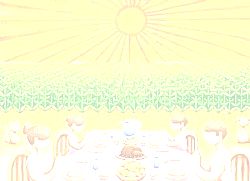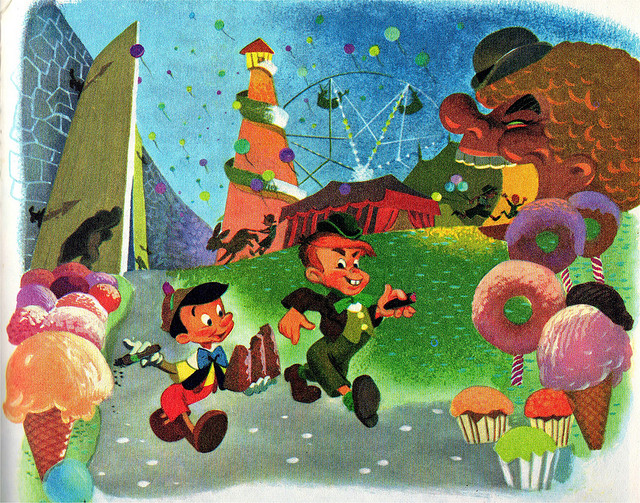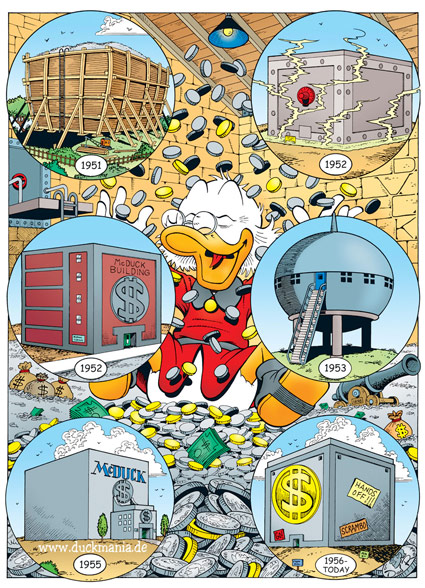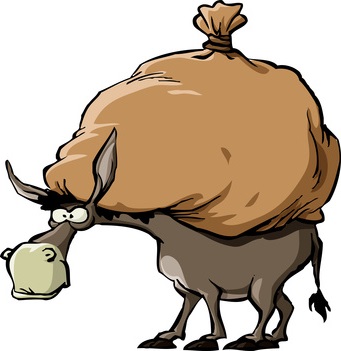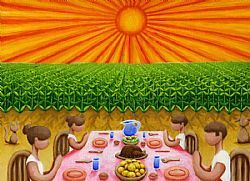The vanity of pleasures *1
1 I said to myself:
"
Come now, I will test myself with pleasure and enjoying good things!"
But this too
was pointless vanity!
2 I had to said of laughter that "
is mad!", and of pleasure that "
what does it accomplish?"...
3 I tried cheering myself with wine, yet with my mind still guiding me with wisdom, to see:
What was good for people to do under the heavens during the short time of their lives?
The vanity of Possessions *2
4 I created great works: I built myself houses, I planted vineyards.
5 I made for myself gardens and orchards and I planted in them all kinds of fruit trees.
6 I made in these ponds from which to water the forest of growing trees.
7 I brought in menservants and maidservants and had servants born in my house.
I also had growing herds of cattle and flocks of sheep, more than anyone before me in Jerusalem.
8 I gathered for myself silver and gold, the wealth of kings and provinces.
I acquired male and female singers, all things that provide sensual delight,
and eye-charming many beautiful concubines.
9 So I grew great, surpassing all, who were before me in Jerusalem;
And my wisdom stayed with me too!
10 I denied myself nothing my eyes desired, I did not withhold my heart from any pleasure.
For my heart rejoiced in all my labor, this was my reward for all my work.
11 Yet when I surveyed all that my hands had accomplished and all for what I had worked hard to achieve;
I realized that all was worthless and meaningless ("feeding on the wind"), and that I did gain nothing under the sun.
The vanity of Wisdom and Folly (foolishness) *3
12 So I decided to examine more carefully the wisdon, stupidity and foolishness!
For what more can the king’s successor do?
Nothing else than what has already been done!
13 And I saw that [
human] wisdom is better than foolishness,
just as light is better than darkness.
14 The wise man has eyes in his head, but the fool walks in darkness.
Yet the same fate awaits them all...
15 So I said to myself:
"
If the same fate waits to the fool as to me, then what did I gain by being wise?"
And I thought to myself, "
This too is meaningless vanity!"
16 "For the wise man like the fool,
will not be long remembered and the time comes when both are forgotten.
Like the fool, once the wise dies too!
The vanity of Labor *4
17 So I came to hate life,
because everything that is done under the sun was despicable to me,
since everything is meaningless vaity and feeding on the wind.
18 I hated all the things for which I had worked exhaustingly hard under the sun,
because I saw that I would have to leave them to the man coming after me.
19 And who knows whether he will be a wise man or a fool?
Yet he will have control over all that I worked for and gathered together wisely I am under the sun.
This is meaningless vanity too.
20 Thus I came to despair over all the things I had worked for under the sun.
21 For there is a man whose work is done with wisdom, knowledge and skill,
yet he has to leave it to someone who did not work for it.
This is not only pointless, but a great evil!
22 For what does a person get from all his efforts and his ambitions striving with which he labors under the sun?
23 For his all life is full with pain and sorrow, even at night his mind gets no rest.
This too is pointless vanity!
So what shall we do? *5
24 Thus there is nothing better for a man to do than to
eat, drink and enjoy the good that results from his work!
I also realized that
this too is from God's hand!
25 For without God who can eat or find enjoyment in anything?
26 To the person who pleases Him, God gives wisdom, knowledge and happiness.
However to the sinner he gives the task of gathering and putting together wealth to hand it over to the one who pleases God.
And this is meaningless, a struggle of chasing the wind.
